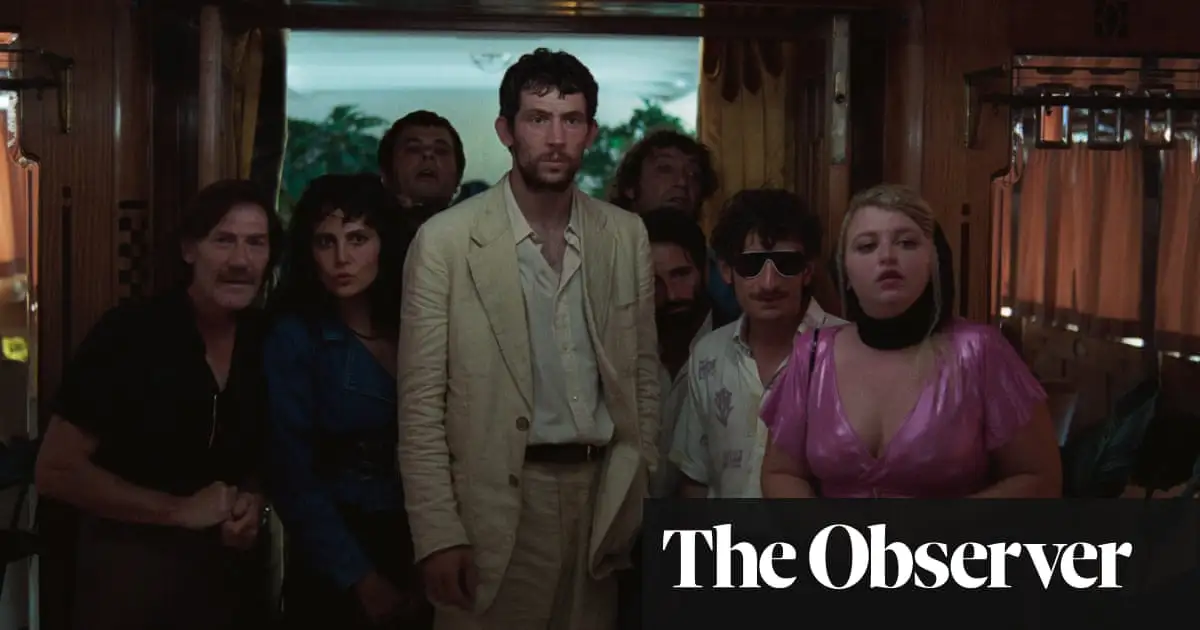- cross-posted to:
- movies@lemm.ee
- cross-posted to:
- movies@lemm.ee
This time last summer, British cinemas were holding their collective breath, looking forward to the biggest box office weekend of the year. “Barbenheimer” came to the rescue, with the doubleheader of blockbusters jointly chalking up an initial total of £30m when released in mid-July.
This summer is a different story. There may be no lucrative Barbie or Oppenheimer at hand, but the holiday months at the cinema look potentially more interesting, if not downright weird – at least when it comes to Sasquatch Sunset, this weekend’s new, grunting, wordless tale of mythical Bigfoot folk, starring Jesse Eisenberg and Elvis Presley’s granddaughter Riley Keough.
As the impact of last year’s Hollywood talent strikes combines with streaming habits formed during Covid lockdowns, a window of opportunity has been created for film-makers’ wilder imaginings; for smaller-scale, arthouse fare. The franchise machine has slowed down and more original, risky features have slipped in. “I feel quite positive about the moment we’re in,” said Isabel Stevens, managing editor of the film magazine Sight and Sound, “although I do appreciate it’s still a very difficult for cinemas.”
So far, 2024 has seen a box office slump, but is being brightened by breakthrough independent productions that dodge commercial templates and are often in foreign languages (that aren’t Sasquatch). Prominent among them is Italian film La Chimera starring British actor Josh O’Connor. Out for over a month now, it is still drawing audiences and has taken over £700,000 at the British and Irish box office. Director Alice Rohrwacher’s film is pulling off a trick that big-budget title The Fall Guy could not manage: it has become a hit beyond its own ambitions. It must also be quite a surprise to Rohrwacher herself, since her last film, Happy as Lazzaro, brought in just a fifth of that.
…
Phil Clapp, head of the UK Cinema Association, recently told Screen International that a “slightly thinner slate of the familiar franchises” had created an intriguing opportunity. “Stories that are something the audience hasn’t seen before, and makes them want to go back to the cinema, are vital for us,” he said.
In the relatively quiet period before the next action juggernauts trundle in, British cinephiles can celebrate the joys of a film such as Wim Wenders’s Perfect Days, the tale of a Tokyo toilet cleaner that has taken more than £1.3m in receipts. Or The Taste of Things, a quiet, kitchen-based French love story with Juliette Binoche, which took just under £700,000. And now there is the sentimental appeal of There’s Still Tomorrow, a black-and-white melodrama that trounced Barbie at the box office in its native Italy and is distributed here by Vue Cinemas. It has taken more than £300,000.
…
An early sign of a fresh thirst for originality came with the foreign-language hits of the latest award season, Anatomy of a Fall and The Zone of Interest, the latter made in German by British director Jonathan Glazer.
Charles Gant, box office editor at Screen International, points out that these apparently niche films are attracting a wide audience. Glazer’s film took £3.4m – a healthy figure in comparison with his 2013 cult horror film Under the Skin, despite that film’s A-list star, Scarlett Johansson. “When I watched the premiere of Zone of Interest in Cannes, I thought it was going to be a hard sell, but it went on to take quite a lot of money,” he said. “And you really have to see it in the cinema.”
…
Still more heartening for Britain is the success of the homegrown films Aftersun, How to Have Sex, Rye Lane and All of Us Strangers, especially in the face of reports that UK independent production has been falling off a cliff. Only in February, Mike Goodridge, producer of the recent Palme d’Or-winning satire Triangle of Sadness, told BBC’s Today programme that it was “essentially on its knees”, with skilled actors and crews all working for big American companies.
Since then, the impact of enhanced tax reliefs for British productions has been felt. That is a measure that might encourage the kind of shake-up spelled out for the Oscar crowd in March by the award-winning screenwriter Cord Jefferson, when he pointedly called on film backers to think smaller. “Instead of making one $200m movie, try making 20 $10m movies. Or 50 $4m movies,” he urged.
As far as Gant can tell, there is no big shift in Hollywood as yet, where franchises still rule the roost. “But studios do now understand they need a mix. Just look at a surprise, smaller-scale hit like the romcom Anyone But You, which has cut through.”

